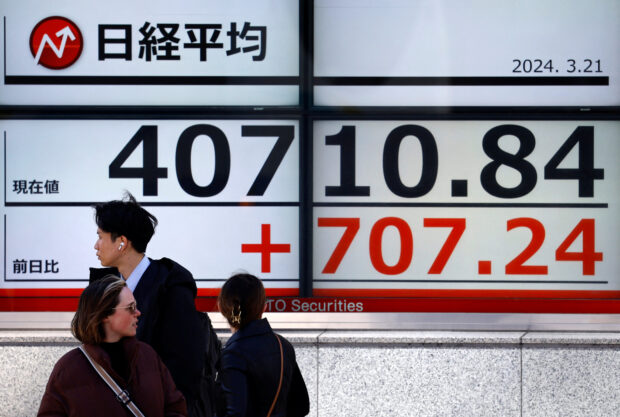
Passersby walk in front of an electric screen displaying Japan’s Nikkei share average outside a brokerage in Tokyo, Japan March 21, 2024. REUTERS/Issei Kato/File photo
SINGAPORE — Asian stocks rose on Tuesday and the dollar firmed, keeping the yen pinned near the 152-per-dollar levels that has traders worried about possible intervention, as expectations that the Federal Reserve was close to cutting interest rates faded.
Data on Monday showed U.S. manufacturing grew for the first time in 1-1/2 years in March as production rebounded sharply and new orders increased, highlighting the strength of the economy and casting doubts on the timing of Fed rate cuts.
The robust manufacturing data sent yields on U.S. Treasuries higher, with two-year and 10-year yields climbing to two-week peaks, boosting the dollar.
MSCI’s broadest index of Asia-Pacific shares outside Japan was 0.65 percent higher, while Japan’s Nikkei reclaimed the 40,000 points mark and was last up 0.41 percent.
The yen was last at 151.715 per dollar, not too far from the 34-year low of 151.975 it touched last week, with traders keenly watching for hints of intervention from Japanese authorities.
“The continued run of robust U.S. data is making the lives of Japanese currency officials attempting to support the yen increasingly uncomfortable,” said Tony Sycamore, market analyst at IG.
“It also means that a smoothing event (physical intervention) is unlikely to occur until after the 152.00 level breaks.”
Forex market intervention
Tokyo intervened in the currency market in 2022, first in September and again in October, as the yen slid toward 152 to the dollar, levels last seen in 1990.
Japanese Finance Minister Shunichi Suzuki said on Tuesday that authorities were ready to take appropriate action against excessive currency market volatility, without ruling out any options.
READ: Japan ready to take action vs excessive yen volatility – finance chief
Chinese stocks were mixed, with the blue chip index largely flat while Hong Kong’s Hang Seng Index was up more than 2 percent, catching gains as the financial hub reopened after a public holiday on Monday.
China stocks logged their biggest daily gain in a month on Monday, after the latest manufacturing activity data signaled that the economy’s recovery is gaining traction.
Overnight, S&P 500 kicked off the first session of the second quarter on a quiet note, weighed by worries over the timing of interest rate cuts after stronger-than-expected manufacturing data pushed Treasury yields higher. The index had clocked the biggest first quarter percentage gain in five years.
READ: Wall St slips as bond yields jump on strong manufacturing data
The yield on 10-year Treasury notes eased 2.4 basis points to 4.305 percent in Asian hours, having touched a two week high of 4.337 percent in the previous session.
The two-year U.S. Treasury yield, which typically moves in step with interest rate expectations, slipped 2.5 basis points to 4.693 percent on Tuesday, not far from the near two-week high of 4.726 percent touched in the previous session.
The elevated yields broadly lifted the dollar, with the euro down 0.11 percent to $1.0731 and sterling last at $1.2541, down 0.07 percent on the day.
Against a basket of currencies, the dollar was 0.038 percent higher at 105.05, just shy of the four-and-a-half month high of 105.07 it touched on Monday after the stronger-than-expected data.
Interest rate cuts
Markets are now pricing in a 61-percent chance of the Fed cutting rates in June, compared with 70 percent a week earlier, according to CME FedWatch Tool. They are also pricing in 68 basis points of cuts this year, lower than the 75 basis points they projected last week.
“Markets may have over-reacted to the blowout ISM manufacturing numbers, considering the Fed chair Powell’s insistence on dialing back policy restraint later this year,” said Nicholas Chia, Asia macro strategist at Standard Chartered.
“If core PCE inflation eases to 2.5 percent-2.6 percent by the June meeting, rate cuts could be in play which open the door to mild USD weakness. The risk is that the Fed fails to reach unanimity on cuts, providing another leg up to US yields and the USD.”
In commodities, U.S. crude rose 0.3 percent to $83.96 per barrel and Brent was at $87.72, up 0.34 percent on the day, aided by signs of improved demand and rising Middle East tensions.
Spot gold eased 0.1 percent to $2,248 per ounce, after hitting an all-time high of $2,265.49 on Monday.